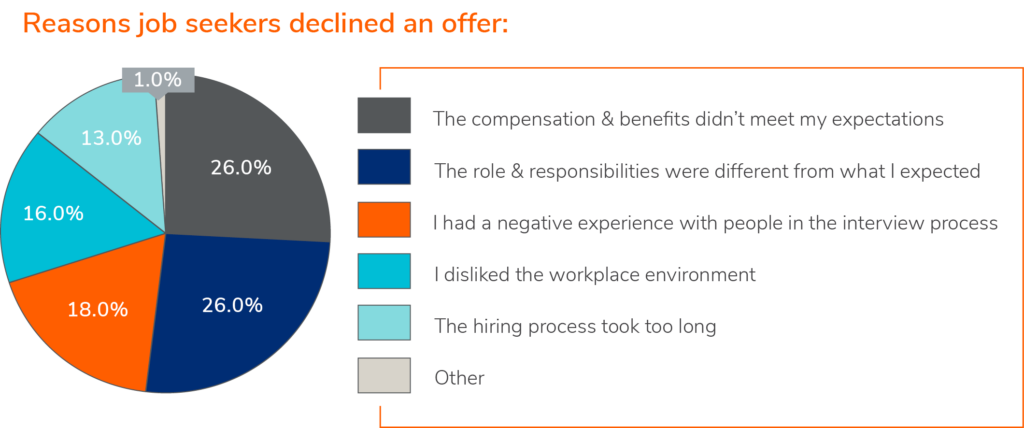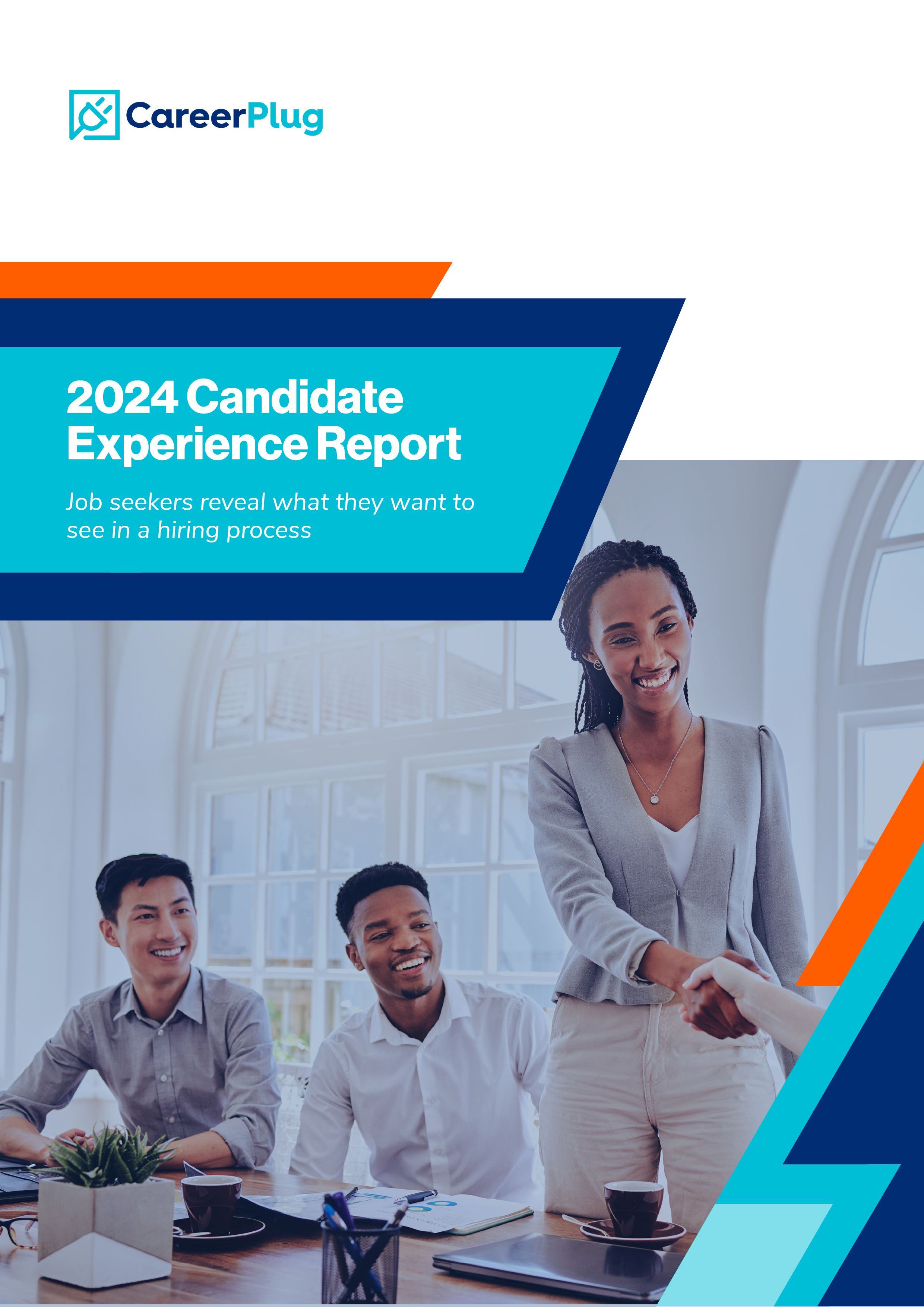You know that having open roles within your business can be stressful. And when you find that perfect candidate to fill a position, you want to be sure to lock them in!
Have you ever felt really good about a candidate? You thought it was a perfect match and couldn’t wait to have them on your team. You made your absolute best offer… only to have them turn it down. This may have led you to settling for your second, third, or even fourth choice candidate.
You might find yourself wondering, what makes someone go through the trouble of applying, interviewing, etc., only to say no once the job is offered? What is it that job seekers want?
At CareerPlug, we wonder the same thing, which is why every year we conduct research to determine what active job seekers want to see from potential employers during the hiring process.
Our latest survey shows that over half of candidates turn down job offers due to poor candidate experience. This means the solution for hiring more of those “got to have” candidates, is improving their experience with you from the job posting to the initial offer.
Let’s dive into the specific problems that occur during the hiring process that keep candidates from accepting an offer and how you as a business owner or hiring manager can address these problems and make the right hires.
Reasons candidates turn down job offers
We define the candidate experience as the experience a candidate has with an employer throughout the hiring process, from job posting to offer. We found that a whopping 52% of job seekers said they’ve declined a job offer because of a poor experience with a potential employer during the hiring process.
The best candidates will always have the benefit of being picky about where they work. Plus, recent changes in the labor market have been favorable for job seekers, giving them more leverage than ever before.
Many factors will influence a job seeker’s final choice. So what are those specific factors of the candidate experience that make or break a job seekers decision?

“The compensation and benefits didn’t meet my expectations.”
One of the biggest reasons that candidates reported turning down a job offer was because of the compensation and benefits not meeting their expectations. This can be frustrating for both parties, but is definitely something that you, as a business owner, can address and avoid.
The solution: At CareerPlug, we encourage transparency from the start. Candidate experience starts with an effective job posting. We suggest putting compensation and benefits into the job posting so that job seekers know before applying whether it is a match. Ultimately this will save you time and help you avoid interviewing applicants that are looking for something different from what you can offer.
“The role and responsibilities were different from what I expected.”
Another top reason that candidates turned down a job is that the role and responsibilities weren’t quite what they expected. An interested candidate that finds out late in the interview process that the job isn’t what they thought will feel like you wasted their time.
The solution: Once again this solution lies within a good job posting. Take the time to think about the role and write a job posting that describes it accurately. Job seekers use the job posting a guidepost when trying to decide whether or not they want to work for your company.
Laying out both the compensation and expectations for the role from the beginning might decrease your number of applicants, but it will weed through candidates that aren’t a good fit. You can be assured that someone that makes it to the interview process is already aware and satisfied with what you have to offer and the responsibilities of the role.
For more guidance on how to create a good job posting, check out this video where our Senior Director of People, Natalie Morgan, outlines the blueprint we use at CareerPlug.
“I had a negative experience with people in the interview process.”
Just as many candidates reported that they have declined a job offer because of a negative experience with people in the interview process.
Interviews are your chance to get to know a candidate, but it’s important for employers to keep in mind that candidates are evaluating them too. The people conducting interviews need to leave candidates with a great impression of the company. If not, there’s a good chance that an offer later on in the hiring process will be declined.
The solution: Creating a positive experience for all candidates is attainable for any business. Train hiring managers and interviewees to conduct great interviews and hold them accountable for it.
Schedule interviews in a timely manner and prepare for interviews thoroughly. Have a standardized list of questions ready and stay present throughout the interview. We suggest handling virtual interviews the same way you would an in-person interview. Give candidates clear instructions, respect their time, and avoid asking candidates to participate in one-way video interviews.
“I disliked the work environment.”
We like to remind employers that even though the hiring process is for evaluating candidates, candidates are doing their own evaluations as well. Candidates are trying to judge if you’re a good place to work, and will use interviews and other interactions with you to determine if they like your work environment and company culture.
The solution: To show candidates that you’re a great place to work, be sure to lead with your best foot forward. Highlight your company culture on your job postings and discuss it during interviews.
Use employer review sites to build your employer brand, and encourage existing employees to leave positive reviews regarding what it’s like to work for you. Leave all candidates with a positive impression of your company.
By the way, if you’re not sure if your work environment is positive, maybe a turned down job offer is the wake up call you need to start making some changes to the workplace. Our Toxic Work Environment Report can give you some insight into what makes up a negative workplace according to employees.
“The hiring process took too long.”
In today’s competitive labor market, to get candidates to say yes to your job offers, you have to move them through your hiring process quickly. If your hiring process takes too long, your candidate may take an opportunity somewhere else.
A couple of job seekers we spoke to put it this way:
The solution: The right hiring software, like CareerPlug, can help you speed up your hiring process and provide a better candidate experience. Tools like text recruiting and automated interview scheduling help you connect with candidates sooner than the competition. Plus, applicant tracking and other hiring automations make it easier to stay organized and keep up with where everyone is in your hiring process.
More things to consider
The importance of the candidate experience may vary from industry to industry. 71% of job seekers in the fitness industry and 64% of job seekers in home and commercial services reported that they have declined a job offer due to a poor experience in the hiring process.
Job seekers in retail reported the lowest rates of poor candidate experiences. 71% said they have not had a negative candidate experience in the last year. And only 35% have declined an offer due to a poor experience.
Clearly, there are variations across different industries, and plenty of other factors that might affect a candidate’s decision, including a better offer elsewhere or the job not aligning with the candidate’s career goals.
However, it’s worth restating that based on our research, no matter how many hours you put into the hiring process or how good your final offer is, if you are creating a negative candidate experience, then half of your offers will be rejected.
The impact of a positive candidate experience
The answer is clear. To get more candidates hired, you have to improve your candidate experience. The good news is that this effort will pay off!
Based on our research, 76% of candidates said a positive candidate experience influenced their decision to accept an offer.
You know that hiring can be stressful. Looking for a job can be stressful as well. Have empathy for your candidates and show them that you value and appreciate their time and effort. Take action to improve your overall candidate experience to ensure more candidates are excited to say yes to your job offer.

Want to know more about what job seekers are looking for?
Download our 2024 Candidate Experience Report to learn how to improve your hiring process and get more candidates to say yes to your job offers!
DOWNLOAD THE REPORT